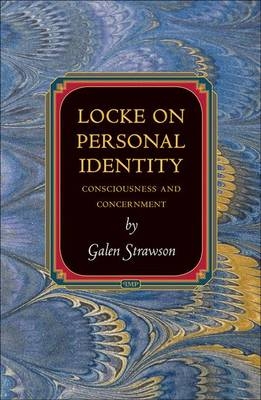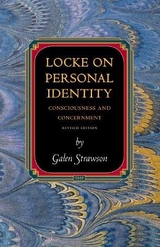
Locke on Personal Identity
Princeton University Press (Verlag)
978-0-691-14757-4 (ISBN)
John Locke's theory of personal identity underlies all modern discussion of the nature of persons and selves - yet it is widely thought to be wrong. In his new book, Galen Strawson argues that in fact it is Locke's critics who are wrong, and that the famous objections to his theory are invalid. Indeed, far from refuting Locke, they illustrate his fundamental point. Strawson argues that the root error is to take Locke's use of the word "person" only in the ordinary way, as merely a term for a standard persisting thing, like "human being." In actuality, Locke uses "person" primarily as a forensic or legal term geared specifically to questions about praise and blame, punishment and reward. In these terms, your personal identity is roughly a matter of those of your past actions that you are still responsible for because you are still "conscious" of them in Locke's special sense of that word. Clearly and vigorously argued, this is an important contribution both to the history of philosophy and to the contemporary philosophy of personal identity.
Galen Strawson taught philosophy at the University of Oxford for twenty years before moving to Reading University in 2001. His many books include "Freedom and Belief" and "Selves: An Essay in Revisionary Metaphysics".
Preface xi Chapter 1: Introduction 1 Chapter 2 : "Person" 5 Chapter 3: "Person ... is a forensic term" 17 Chapter 4: Concernment 22 Chapter 5: Consciousness 30 Chapter 6:"Consciousness ... is inseparable from thinking" 42 Chapter 7 : "From the inside" 50 Chapter 8 : "Person" Locke's Definition 58 Chapter 9 : Consciousness Is Not Memory 72 Chapter 10 : Personal Identity 77 Chapter 11 : Psychological Connectedness 88 Chapter 12 : Transition (Butler Dismissed) 93 Chapter 13 : "But next ... ": Personal Identity without Substantial Continuity 97 Chapter 14 : "And therefore ... ": [I]-transfers, [Ag]-transfers, [P]-transfers 110 Chapter 15 : "A fatal error of theirs" 119 Chapter 16 : A Fatal Error of Locke's? 125 Chapter 17 : Circularity? 131 Chapter 18 : The Distinction between [P] and [S] 135 Chapter 19 : Concernment and Repentance 139 Chapter 20 : Conclusion 150 Postface 157 Appendix 1 : "Of Identity and Diversity" by John Locke 163 Appendix 2 : A Defence of Mr. Locke's Opinion Concerning Personal Identity by Edmund Law 233 References 253 Index 257
| Erscheint lt. Verlag | 9.10.2011 |
|---|---|
| Reihe/Serie | Princeton Monographs in Philosophy |
| Zusatzinfo | 4 line illus. |
| Verlagsort | New Jersey |
| Sprache | englisch |
| Maße | 140 x 216 mm |
| Gewicht | 454 g |
| Themenwelt | Geisteswissenschaften ► Philosophie ► Erkenntnistheorie / Wissenschaftstheorie |
| Geisteswissenschaften ► Philosophie ► Geschichte der Philosophie | |
| Geisteswissenschaften ► Philosophie ► Philosophie der Neuzeit | |
| ISBN-10 | 0-691-14757-4 / 0691147574 |
| ISBN-13 | 978-0-691-14757-4 / 9780691147574 |
| Zustand | Neuware |
| Haben Sie eine Frage zum Produkt? |
aus dem Bereich


![Was heißt Denken?. Vorlesung Wintersemester 1951/52. [Was bedeutet das alles?] - Martin Heidegger](/media/113619842)
